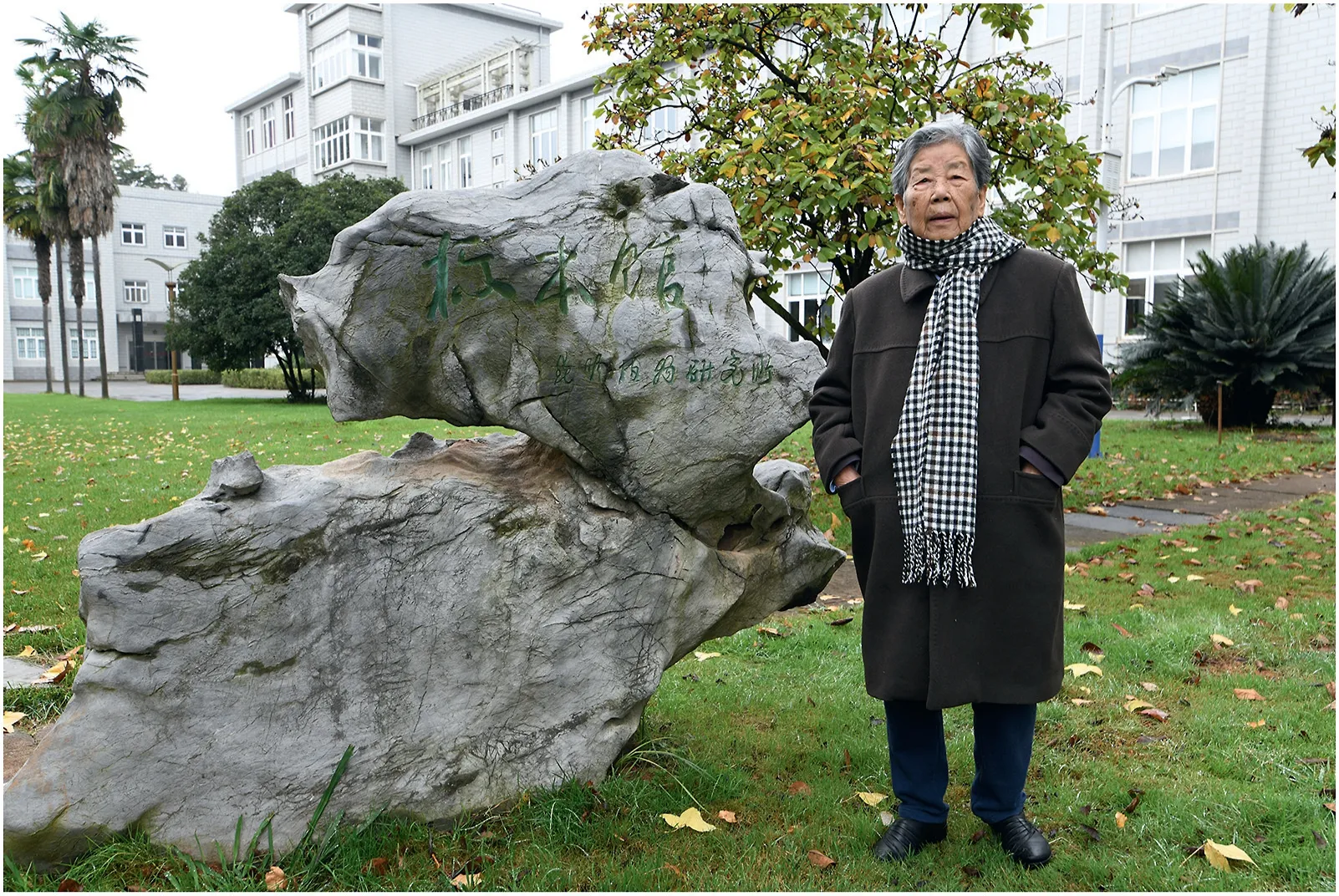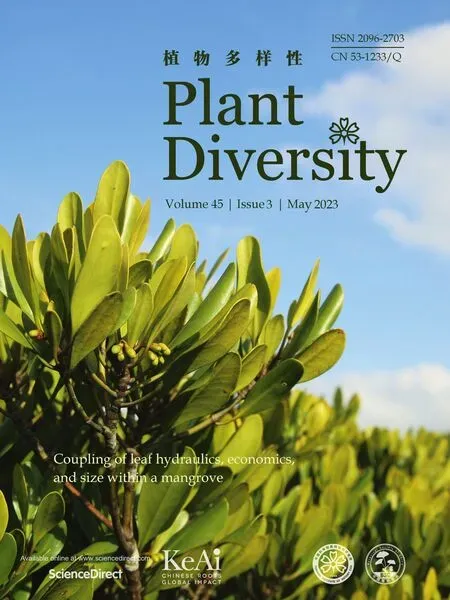Honoring a legend: Celebrating the life and legacy of Professor Heng Li
Professor Heng Li(李恒,March 9,1929-January 12,2023)was a legendary plant taxonomist and phytogeographer at the Kunming Institute of Botany, Chinese Academy of Sciences (Fig.1).She made important contributions to our understanding of China's flora,including the biodiversity and biogeography of Dulong Valley and the Gaoligong Mountains, as well as the vegetation of plateau lakes and wetlands in Southwest China.
Professor Heng Li received her Bachelor's degree in Russian from Beijing Foreign Studies University in 1956 and immediately joined the Institute of Geography (now Institute of Geographic Sciences and Natural Resources Research), Chinese Academy of Sciences, as a Russian translator.In 1961, Prof.Li moved to Kunming with her husband Mr.Jinwei Wang, a talented architect, and started her career as a plant taxonomist at the Kunming Institute of Botany,where she worked until the last few days of her life.Prof.Li had a long,productive,and creative career as a researcher in the Department of Plant Taxonomy and Phytogeography(now CAS Key Laboratory for Plant Diversity and Biogeography of East Asia) at the Kunming Institute of Botany (Figs.1 and S1), publishing 199 research articles,70 monographs,as well as books and translations(Appendix A)on plant taxonomy and floristics.She collected more than 45,000 plant specimens, and described 166 new species, 12 new taxa at subgeneric, sectional and series ranks, and 34 new combinations.As a plant taxonomist, Prof.Li identified over 36,000 specimens, in 232 families,1256 genera, and ca.3800 species at the Herbarium of the Kunming Institute of Botany (KUN)alone.In recognition of her outstanding contributions to botany,one genus and 17 species have been named in her honor (Fig.S2;Appendix B).
Prof.Li was a key author in the compilation of a series of great works, including Flora Reipublicae Popularis Sinicae, Flora of China,Flora Yunnanica, Flora Xizangica, Vegetation of Yunnan, and Outline of New China Herbals.She contributed to the treatments of 36 families in these books,including Araceae,Lemnaceae,Acoraceae,Liliaceae, Orchidaceae, Trilliaceae, Amaryllidaceae, Hydrocharitaceae,Bombacaceae,Burseraceae,Meliaceae,Dioscoreaceae,Droseraceae,Onagraceae, Alismaceae, Potamogetonaceae, and Stemonaceae.These books are widely used to train young professionals in botany at research institutions,colleges,and universities.
Prof.Li was an authority on the taxonomy of monocots in China,especially the family Araceae(sensu lato,including Lemnaceae and Acoraceae)and the genus Paris(Trilliaceae).Through her extensive herbarium and field research, she explored the species diversity of Araceae in China and, by determining the geographical distribution of extant aroid species, proposed that Araceae originated in tropical Asia and that the Himalaya-Hengduan Mountains were the differentiation center of the genus Arisaema(Li,1980a,1996).In her monograph“The Genus Paris”,Prof.Li proposed a worldwide system of classification for the genus, and made a detailed review of its morphology, embryology, genetics,and phytochemistry(Li,1998).The system is now widely adopted by plant taxonomists.
In October 1990, Prof.Li led an eight-month overwintering botanical expedition to Dulong Valley, an upper tributary of the Irrawaddy between Yunnan and Xizang.In 1996, at the age of 67,she again led a scientific expedition to the Gaoligong Mountains at the border between China and Myanmar in cooperation with scientists from the California Academy of Sciences,USA,and the Royal Botanic Garden Edinburgh, UK (Fig.S3).The two books edited by Prof.Li,“Flora of Dulongjiang Region”and“Flora of Gaoligong Mountains”, documented all plants known in this remote area based on specimens collected by Chinese and Western scientists.Through in-depth research, Prof.Li comprehensively explained the origin and evolution of the flora of Dulong Valley and the Gaoligong Mountains (Li, 1994a; Li and Guo, 2000).She also pioneered the“biological effect of plate movement”hypothesis to explain the causes and mechanisms that underlie the formation of the“ecogeographic diagonal”,an important distribution pattern of the flora of Yunnan (Li, 1994b; Li et al., 1999).This hypothesis has inspired many biogeographical studies on South Asia (Zhu and Yan, 2003;Zhu, 2015; Zhu et al., 2021; Jia et al., 2022).

Fig.1.Prof.Heng Li on her 90th birthday in front of the herbarium at the Kunming Institute of Botany, Chinese Academy of Sciences (KUN).Photographer unknown.
Beyond her taxonomic and floristic studies, Prof.Li published several important papers on vegetation and biodiversity of plateau lakes in Southwest China (e.g., Li,1980b,1987).These papers have provided fruitful and constructive suggestions for the ecological restoration and environmental management of Dianchi, Erhai and other plateau lakes and wetlands in Yunnan and Sichuan provinces,including the Dashanbao Black-necked Crane National Nature Reserve.
In addition to academic research,Prof.Li contributed her professional knowledge to the educational,economic,and social development of remote communities.She not only provided financial support for several school-age children to finish their education,but also made generous donations to the construction of Hope Schools.Prof.Li also dedicated herself to the cultivation, breeding and industrialization of important medicinal plants such as Paris and Amorphophallus(konjac).
Prof.Li is respected worldwide by her colleagues and students for her diligence and persistence.She trained numerous graduate students and young professionals in plant taxonomy, phytogeography and economic botany, either formally or informally(Fig.S4).Most of these students have continued their work on plant taxonomy, phytogeography, and biodiversity conservation in colleges, universities, research institutes, and nature reserves throughout China.
In recognition of her academic achievements,outstanding contributions to science, and her efforts to train plant taxonomists,Prof.Li received numerous award and honors,such as the First Prize of Natural Science Award of Chinese Academy of Sciences in 1994,the prestigious H.W.Schott Achievement Award from International Aroid Society in 2013, and the Outstanding Graduate Student Advisor Award from Chinese Academy of Sciences twice (in 1998 and 2005).In 2016,Prof.Li was awarded the honorary title of“Jiusan Model”by the Central Committee of Jiusan Society.
Although Prof.Li has left us, her spirit will continue to inspire generations of plant biologists.
Author contributions
All authors conceived and wrote the manuscript.
Declaration of competing interest
The author declares no conflict of interest.
Acknowledgement
The authors thank Drs.De-Zhu Li,Jian-Qiang Wu,and Jian-Wen Zhang for reviewing the manuscript.
Appendix A.Supplementary data
Supplementary data to this article can be found online at https://doi.org/10.1016/j.pld.2023.03.003.
——访著名板胡教育家李恒
- 植物多样性的其它文章
- A method for quantifying relative competitive advantage and the combined effect of co-invasion for two invasive plants
- Does regional species diversity resist biotic invasions?
- U.PhyloMaker: An R package that can generate large phylogenetic trees for plants and animals
- GhWRKY33 negatively regulates jasmonate-mediated plant defense to Verticillium dahliae
- Metabolic and transcriptomic analyses elucidate a novel insight into the network for biosynthesis of carbohydrate and secondary metabolites in the stems of a medicinal orchid Dendrobium nobile
- Floral trait variation across individual plants within a population enhances defense capability to nectar robbing

